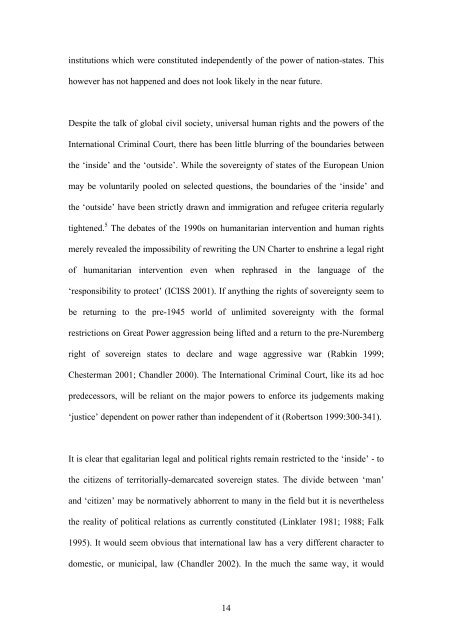After the Interregnum - David Chandler
After the Interregnum - David Chandler
After the Interregnum - David Chandler
You also want an ePaper? Increase the reach of your titles
YUMPU automatically turns print PDFs into web optimized ePapers that Google loves.
institutions which were constituted independently of <strong>the</strong> power of nation-states. This<br />
however has not happened and does not look likely in <strong>the</strong> near future.<br />
Despite <strong>the</strong> talk of global civil society, universal human rights and <strong>the</strong> powers of <strong>the</strong><br />
International Criminal Court, <strong>the</strong>re has been little blurring of <strong>the</strong> boundaries between<br />
<strong>the</strong> ‘inside’ and <strong>the</strong> ‘outside’. While <strong>the</strong> sovereignty of states of <strong>the</strong> European Union<br />
may be voluntarily pooled on selected questions, <strong>the</strong> boundaries of <strong>the</strong> ‘inside’ and<br />
<strong>the</strong> ‘outside’ have been strictly drawn and immigration and refugee criteria regularly<br />
tightened. 5 The debates of <strong>the</strong> 1990s on humanitarian intervention and human rights<br />
merely revealed <strong>the</strong> impossibility of rewriting <strong>the</strong> UN Charter to enshrine a legal right<br />
of humanitarian intervention even when rephrased in <strong>the</strong> language of <strong>the</strong><br />
‘responsibility to protect’ (ICISS 2001). If anything <strong>the</strong> rights of sovereignty seem to<br />
be returning to <strong>the</strong> pre-1945 world of unlimited sovereignty with <strong>the</strong> formal<br />
restrictions on Great Power aggression being lifted and a return to <strong>the</strong> pre-Nuremberg<br />
right of sovereign states to declare and wage aggressive war (Rabkin 1999;<br />
Chesterman 2001; <strong>Chandler</strong> 2000). The International Criminal Court, like its ad hoc<br />
predecessors, will be reliant on <strong>the</strong> major powers to enforce its judgements making<br />
‘justice’ dependent on power ra<strong>the</strong>r than independent of it (Robertson 1999:300-341).<br />
It is clear that egalitarian legal and political rights remain restricted to <strong>the</strong> ‘inside’ - to<br />
<strong>the</strong> citizens of territorially-demarcated sovereign states. The divide between ‘man’<br />
and ‘citizen’ may be normatively abhorrent to many in <strong>the</strong> field but it is never<strong>the</strong>less<br />
<strong>the</strong> reality of political relations as currently constituted (Linklater 1981; 1988; Falk<br />
1995). It would seem obvious that international law has a very different character to<br />
domestic, or municipal, law (<strong>Chandler</strong> 2002). In <strong>the</strong> much <strong>the</strong> same way, it would<br />
14
















